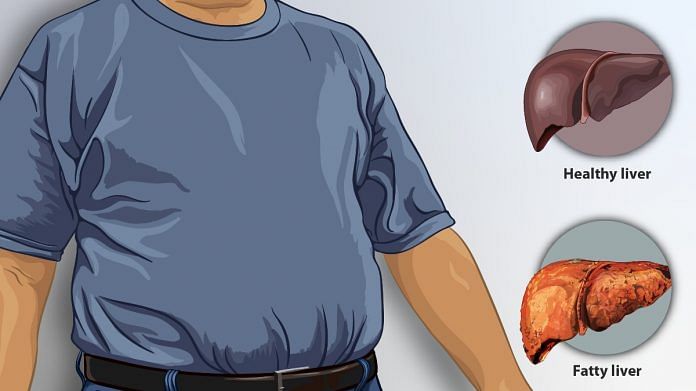New Delhi: The Covid pandemic began with one disease but has now spawned many other outbreaks in its wake — many not directly related to the SARS-CoV-2 virus.
One of these is an increase in liver diseases — in part because of a rise in alcohol use during the pandemic, a phenomenon that has been documented globally. There is also an increase in the incidence of non-alcoholic fatty liver disease (NAFLD), doctors say, because of the rise in obesity and sedentary lifestyle during the multiple Covid lockdowns.
Fatty liver is a condition when there is an accumulation of excess fat in the liver. It can be caused by diet, lack of exercise, and/or alcohol consumption. Liver diseases can also be triggered by infections, the most common being Hepatitis C. Doctors also say they are seeing an increase in cases of liver cancer post-Covid, although there is not enough documented evidence to link it either to Covid or the measures taken for its control.
“There has been a 10-15 per cent increase in the incidence of NAFLD during the pandemic. This is linked to increased obesity and a sedentary lifestyle during the pandemic,” Dr Souvik Mitra, consultant gastroenterologist at the Indian Institute of Liver and Digestive Diseases, Kolkata, told ThePrint.
“We are also seeing a significant increase in liver diseases caused by alcohol, though it may be difficult to put a figure to it. We also see a lot of Hepatitis A because many people missed their vaccinations,” Mitra added.
The increased use of alcohol and rising incidence of alcoholic liver disease (ALD) during the pandemic has been a global phenomenon. In a paper published last year in the journal Hepatology, researchers from the Massachusetts General Hospital wrote: “One-year increase in alcohol consumption during the Covid-19 pandemic is estimated to result in 8,000 additional ALD-related deaths, 18,700 cases of decompensated cirrhosis, and 1,000 cases of HCC (hepatocellular carcinoma) and 8.9 million disability-adjusted life years between 2020 and 2040.
“Between 2020 and 2023, alcohol consumption changes due to Covid-19 will lead to 100 additional deaths and 2,800 additional decompensated cirrhosis cases. A sustained increase in alcohol consumption for more than 1 year could result in additional morbidity and mortality,” it predicted.
Also Read: Covid may increase your chances of getting diabetes, new US study says
Rise in liver transplants
Ordinarily, just about five to seven per cent of alcohol-related liver diseases reach a stage where they need a transplant, said Dr Mitra.
And yet, Dr Subhash Gupta, chairman of the Centre for Liver and Biliary Sciences at Max Superspeciality Hospital in Saket, New Delhi, said he had seen a significant rise in people who need a liver transplant because of the damage caused by alcohol.
“During the pandemic, we saw many more people with alcoholic liver disease and a lot of young people came to us. I would say such cases have doubled during the pandemic,” he said. “In fact, in 2021, we did 300 transplants — our highest ever in one calendar year. This is despite the fact that foreign patients did not come.”
In comparison, he said 200-250 liver transplants were carried out a year before the pandemic.
“There are also some suggestions that Covid may have increased liver cancers, but there is not enough data on that,” Dr Gupta said.
However, another transplant surgeon, who did not want to be named, pointed out that the rise in NAFLDs has been a gradual process over the last decade or so, with the increase in refined sugars in our diet. “But the Covid lockdown has precipitated an explosive rise,” this doctor said.
Also read: What’s the BA.2.12.1 Omicron sub-lineage, reported to be behind the renewed Covid surge in Delhi
‘Increased detection, not disease’
Dr Ajay Kumar, gastroenterologist and chairman of the Institute of Digestive and Liver Diseases at BLK-Max Hospital, Delhi, conceded that patients have increased post-pandemic but said it was possible that there has not been an actual increase in the disease incidence. Instead, the increase could be in the detection.
“Through the pandemic, a lot of different types of medicines were used, both traditional and modern medicines. The side-effects of many of those caused liver problems, but these were mostly self-limiting. Then there were people living with underlying, silent, compensated liver disease that were picked up during the pandemic,” he said.
“Also, there were some patients who had been living with a liver condition that worsened during the pandemic, as had happened with a lot of other diseases. I do not think Covid led to an unnatural increase in liver diseases,” Dr Kumar added.
(Edited by Uttara Ramaswamy)
Also Read: As Covid cases rise in Delhi, experts say little reason to worry as most people have immunity



